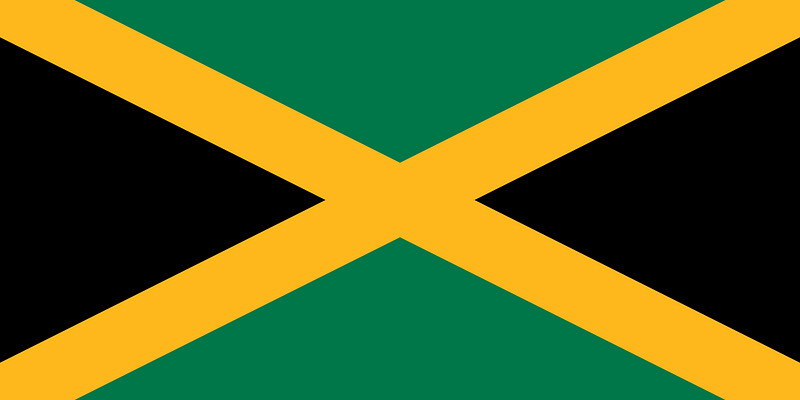This travel wiki page of Jamaica will help guide travelers with quick and relevant information to consider when planning and visiting the country. It is difficult to find all the relevant information on Jamaican culture, safety, travel restrictions, and things to do, so we summarize it all here. If anything is stale or outdated, please let us know! Let’s dive in and explore more high-level information as a Jamaica Trip Planner.
Last updated June 25th of 2023.
Table of contents
National Information & Culture
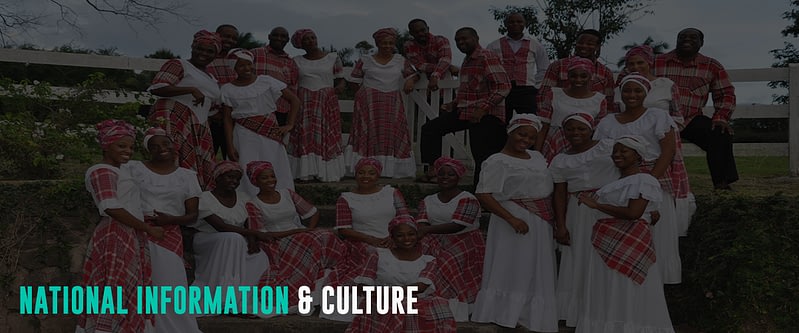
Jamaica is an island country in the Caribbean Sea and the third largest island of the Greater Antilles and the Caribbean. Jamaica lies south of Cuba, west of Hispaniola (Haiti and the Dominican Republic), and northwest of the British Overseas Territory of the Cayman Islands. The capital and largest city is Kingston, while the national currency is the Jamaican Dollar (JMD).
With over four million annual tourist arrivals, tourism is one of Jamaica’s leading sources of revenue. The country’s mining industry follows it.
Jamaican culture blends Taíno, African, Indian, Spanish, Chinese, German, Portuguese, Syrian, Lebanese, English, Irish, French, and Welsh influences. These are visible in Jamaican cuisines, place names, architecture, music, dance, folklore, and language. The country is renowned for reggae music, popularized by legendary musician Bob Marley. The pulsating rhythms of reggae permeate the air and provide a soundtrack to daily life on the island.
While the laid-back and friendly nature of Jamaicans is inviting, some cultural nuances may surprise and even challenge visitors. The concept of time, often called “island time,” may differ from what you are accustomed to. Expect a more relaxed approach to punctuality and schedules.
It’s also important to be mindful of local customs and etiquette. Dress modestly when visiting rural areas or religious sites, and always ask for permission before taking someone’s photograph. Respect for elders is highly valued in Jamaican culture, so addressing people with proper titles, such as “Mr.” or “Miss,” is considered polite.
Visit Jamaica’s Official Tourism Website for more tips and information when planning your trip.
Special Travel Considerations
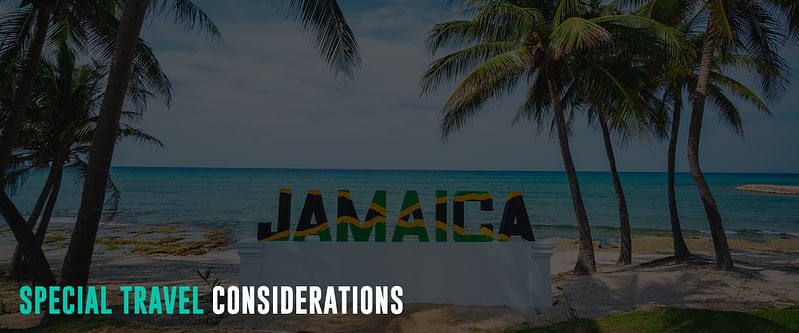
Each country and destination has rules and regulations that every traveler must consider. Hence, check the following considerations for hassle-free travel to Jamaica.
Covid-19 Policy
Effective April 16, 2022, Jamaica does not have entry requirements related to Covid-19. Therefore, travelers do not need proof of vaccination or undergo Covid-19 tests. In addition, using face masks in enclosed spaces is no longer mandatory. However, the Health Ministry has increased the monitoring of health symptoms at all international points of entry.
The Covid-19 policy of Jamaica may vary over time with the evolution of the pandemic. Hence, monitor the latest Covid-19 entry requirements when planning your trip. Travelers can also check the Visit Jamaica portal for updates.
Travel Insurance
While travel insurance is not mandatory to enter Jamaica, it is advisable to have one that covers emergency medical treatment, including Covid-19, repatriation, and evacuation. Travel insurance can protect you against the inconvenience of injury, medical emergencies, theft, and flight cancellations. In addition, it is comprehensive protection in case anything goes wrong with your trip.
Visa Information
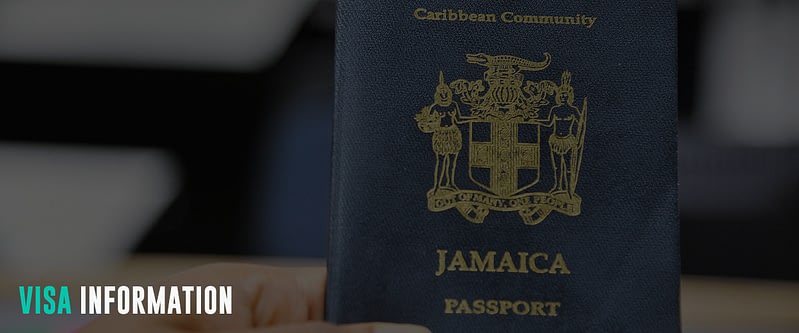
Nationals from 122 countries do not require visas for social or business visits and stay for 30 to 180 days. On the other hand, citizens from 75 countries must apply for visas from the nearest Jamaican Embassy or Diplomatic Missions. Meanwhile, passport holders from 11 countries can also apply for a visa on arrival, subject to applicable visa fees.
Aside from a visa, all visitors to Jamaica must have a valid passport (preferably six months) beyond their stay and return or onward ticket. They must also complete and sign the Immigration/Customs C5 form, either online or in a physical form distributed by the airline during the flight.
Visit the Travel Documents page of the Passport, Immigration, and Citizenship Agency portal for the complete visa application process and requirements for Jamaica.
Popular Attractions
The Caribbean Island country of Jamaica offers a diverse range of attractions. It has become a favorite tourist destination, from pristine beaches and lush mountains to reggae music and flavorful cuisine.
Dunn’s River Falls and Park
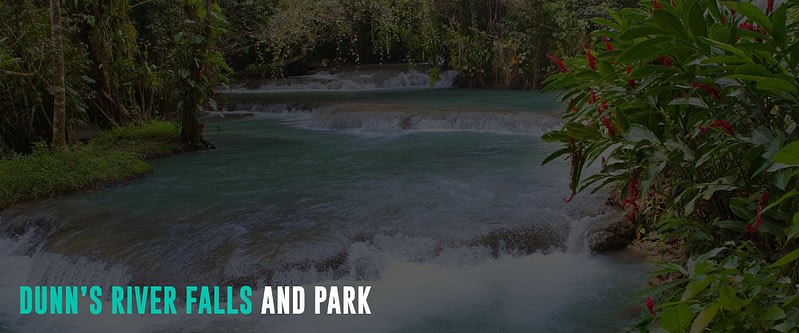
Dunn’s River Falls in Ocho Rios, Jamaica, is one of the Caribbean’s most famous and popular tourist attractions. These terraced waterfalls cascade into the sea, offering a unique and picturesque experience. It has an iconic beauty with the opportunity to climb and swim in the rock pools. Visitors can climb the falls with the assistance of local guides and cool off in the refreshing pools at the base. It’s advisable to wear water shoes and swimwear for an enjoyable adventure. Moreover, planning your visit in the early morning or late afternoon, outside peak cruise ship times, is best to avoid crowds.
Blue and John Crow Mountains National Park
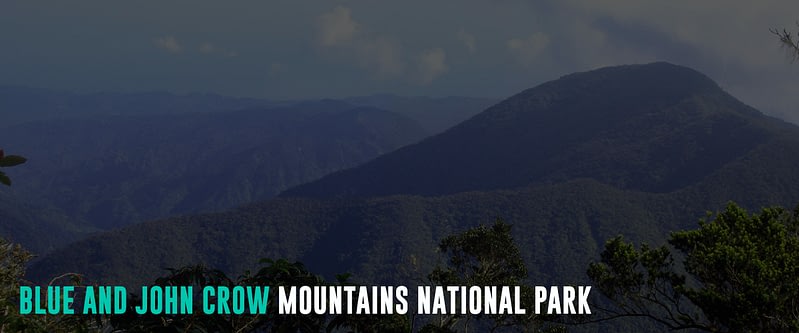
The Blue and John Crow Mountains National Park in Jamaica is a UNESCO World Heritage Site, spanning over 100,000 acres. The Blue Mountains feature Jamaica’s most extended mountain range and are known for their lush scenery and diverse plant life. The park is home to many rare and endangered mammals, amphibians, and bird species and offers incredibly lush scenery of 1,300 flowering plants and 530 fern species. Hence, the park is excellent for birdwatching, hiking through the rare tropical cloud forest in the Holywell Nature Walks, and exploring coffee plantations.
Blue Mountain Peak, the highest peak in the Caribbean, is also a popular attraction for nature enthusiasts and adventure travelers, offering breathtaking views and the opportunity to witness a stunning sunrise. The park’s rich natural and cultural heritage, including its history as a refuge for formerly enslaved people and Indigenous Taino peoples, adds to its appeal. The Blue and John Crow Mountains National Park is easily accessible from Kingston and provides a range of outdoor experiences, making it a must-visit destination in Jamaica.
Bob Marley Museum
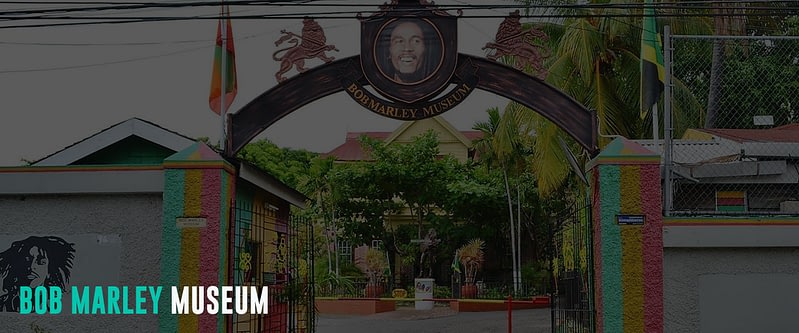
The Bob Marley Museum is a must-visit for reggae lovers and offers a glimpse into Jamaica’s iconic reggae culture. Located in Kingston, the museum was the former residence and studio of the legendary musician Bob Marley. In about an hour or two, you can explore the museum and see Marley’s treasured possessions, including his guitar donated by his wife. The rooms are set up to reflect his favorite spaces during his lifetime.
The museum also features an 80-seat theater, a record store, and a gift shop where you can find a range of Bob Marley memorabilia. Consider booking a “One Love” Tour, which grants access to the museum and the Tuff Gong Recording Studio. If you’re in Montego Bay, a full-day tour to the Bob Marley Museum is available, providing transportation and an authentic Jamaican lunch.
Seven Mile Beach, Negril
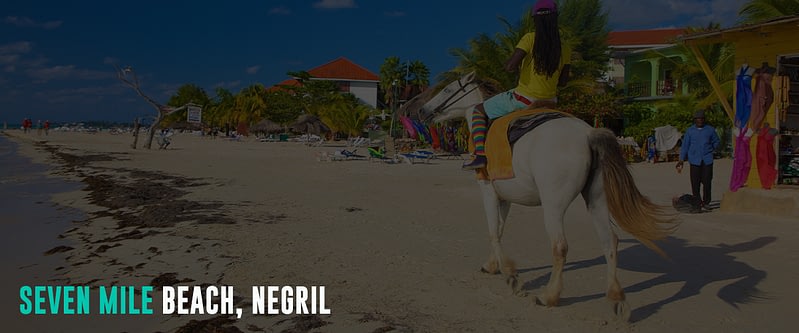
Negril Beach, also known as Seven Mile Beach, is famous as one of the Caribbean and the world’s best beaches. It has a stunning stretch of white sand and turquoise waters, a picturesque setting with coconut palm groves, and a backdrop of the famous Negril Cliffs.
Activities abound for water lovers, including snorkeling around the coral reefs of Long Bay, diving, parasailing, paddleboarding, and even cliff jumping at the Negril Cliffs. Families can visit Kool Runnings Adventure Park, Jamaica’s largest water park. There are also sunset catamaran cruises, golf courses, a nature reserve, and vibrant nightlife experiences for those seeking relaxation. Although around four miles long, Negril Beach’s shoreline provides ample space for sunbathing, strolling, and enjoying the Caribbean sunsets.
Whether you want to indulge in water sports, explore underwater wonders, or unwind on the beach, Negril Beach offers an idyllic setting for a memorable vacation.
Ocho Rios
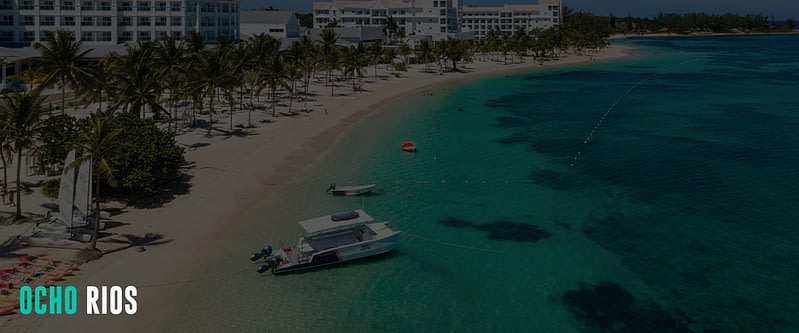
On Jamaica’s north coast, Ocho Rios is a famous resort town and the country’s biggest cruise port. It has become a captivating tourist destination from a former fishing village with a vibrant atmosphere and diverse attractions and activities for every traveler.
One of the top attractions in Ocho Rios is Dunn’s River Falls, a world-famous waterfall leading to a stunning beach. Nature enthusiasts will also love exploring the Blue Hole. For adventure seekers, Mystic Mountain is a must-visit, and experience the thrill of ziplining, bobsled, and sky explorer ride through the lush rainforest.
Dolphin Cove offers an unforgettable experience where travelers can swim with dolphins. They can also interact with stingrays and take a glass-bottom boat tour to discover the vibrant marine life.
To delve into Jamaican history and culture, explore the Firefly Estate. It is the former home of playwright Sir Noël Coward, offering stunning views and insights into the island’s rich heritage.
Renowned for its pristine beaches, travelers in Ocho Rios can spend a day relaxing on the golden sands of Turtle Beach or Mahogany Beach. Additionally, visitors can soak up the sun, swim in crystal-clear waters, or indulge in water sports such as snorkeling, kayaking, or jet skiing.
Irie Blue Hole
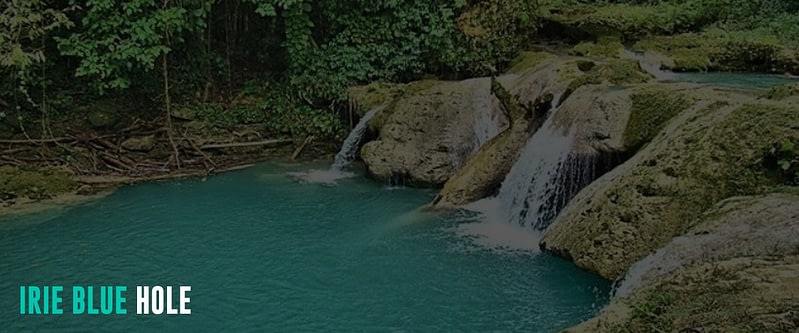
Located in the rural hills of Ocho Rios, the Irie Blue Hole or Secret Falls in Jamaica are a tourist and local island favorite. It features a 20-foot waterfall with multiple deep turquoise swimming holes and underwater caves. Visitors can go cliff diving from various heights, rope swing across the deep blue water, climb behind the waterfalls, explore caves, or take a refreshing dip in the natural springs. Moreover, travelers can immerse themselves in the tranquility of the tropical landscape.
Visitors must hire a local guide in nearby Ocho Rios to explore this off-the-beaten-track place.
Port Antonio
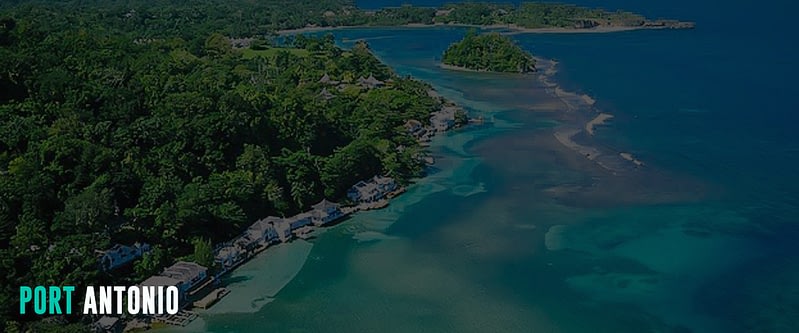
Port Antonio is a hidden gem on the northeastern coast of Jamaica and is known for its pristine natural beauty, lush rainforests, and tranquil beaches. With its unspoiled natural beauty, secluded beaches, and various adventurous activities, Port Antonio offers a peaceful and rejuvenating getaway.
Aside from the Blue Lagoon, a must-visit is the secluded beach paradise of the Frenchman’s Cove. Nature lovers will also appreciate a visit to Reach Falls, a stunning cascade nestled within the tropical rainforests.
For a cultural experience, explore the historic ruins of Folly Estate. This former plantation showcases the remnants of a grand mansion and offers a glimpse into Jamaica’s colonial past. Wander through the ruins and imagine life during the plantation era.
Adventure seekers will find plenty of thrilling activities in Port Antonio. Embark on a rafting journey down the Rio Grande, where you can relax and enjoy the scenic beauty as you float along the gentle currents. Meanwhile, food enthusiasts can indulge in the local cuisine by visiting the Port Antonio Market and sampling fresh fruits, vegetables, and authentic Jamaican dishes. A must is the famous jerk chicken, a delicious and spicy Jamaican specialty.
Blue Lagoon
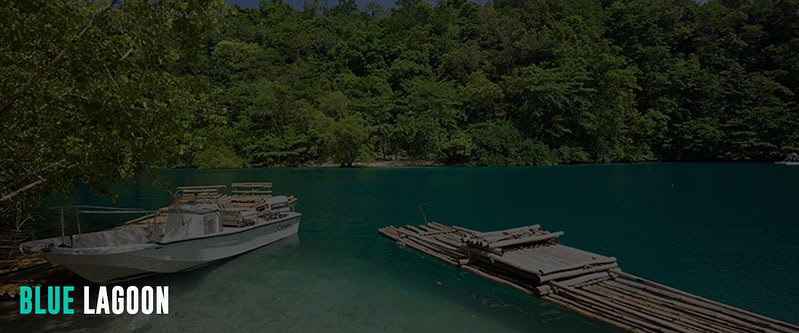
The Blue Lagoon, a 180-foot-deep turquoise body of water, is one of the top attractions on the east coast of Port Antonio. Rainforests surround it, and it is renowned for its crystal-clear waters. Depending on how the sun hits the water, it changes colors from either sapphire, royal blue, or turquoise.
Visitors can take a refreshing swim, go snorkeling, or relax and soak in the tranquil ambiance of this natural wonder. Additionally, travelers can take a leisure boat or bamboo raft ride on the Blue Lagoon afloat.
Montego Bay
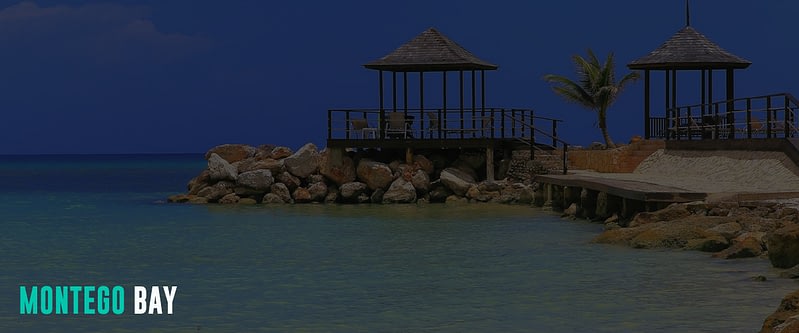
Montego Bay on the northwest coast of Jamaica offers a perfect blend of relaxation, adventure, and entertainment. It is known for its beautiful beaches, vibrant nightlife, and rich cultural heritage.
One of the top attractions in Montego Bay is the tropical paradise of Doctor’s Cave Beach. It features crystal-clear turquoise waters and powdery white sand, ideal for snorkeling and swimming. Visitors can also bask in the sun and enjoy the stunning views of the Caribbean Sea.
Adventure seekers can’t miss the opportunity to go on a thrilling zip-lining excursion at the nearby Cranbrook Flower Forest. Lastly, take a guided Rose Hall Great House tour to taste history and culture.
Kingston
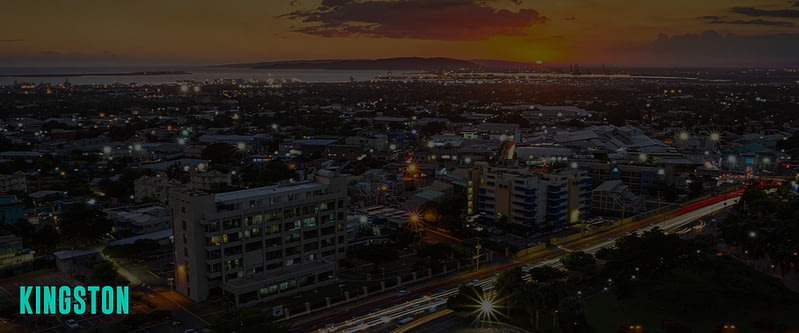
The vibrant capital city of Jamaica, Kingston, is a bustling hub of culture, history, and entertainment. The city uniquely blends Caribbean charm, urban energy, and rich heritage.
A must-visit for reggae enthusiasts is the Bob Marley Museum. For history buffs, the National Gallery of Jamaica is highly recommended. Visitors can also take a step back at the historic Devon House, a beautifully preserved mansion once home to Jamaica’s first black millionaire. Head to the bustling Kingston Craft Market to experience the local culture and vibrant street life. And for a taste of authentic Jamaican cuisine, visit the famous Coronation Market.
Moreover, travelers can embrace the natural beauty of Kingston by visiting the Hope Botanical Gardens and Zoo. Lastly, embarking on a hiking adventure to the nearby Blue Mountain will be a relaxing escape from the city.
Primary Spoken Language(s)
Jamaica’s official language is English. But most of the population also speaks Jamaican or Patois (or Patwa), a vibrant local dialect. Hence, language will not be a barrier when traveling to Jamaica.
Safety Concerns
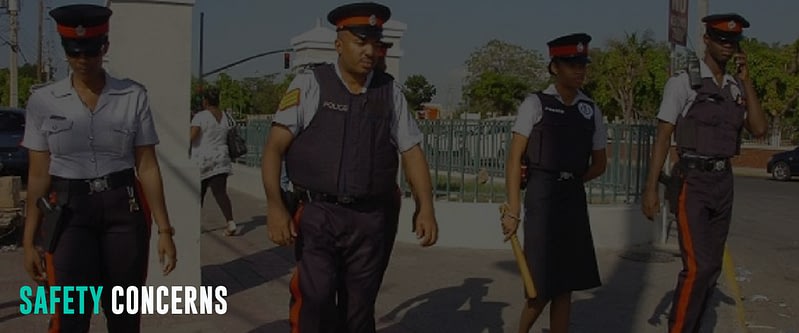
Despite news on the country’s high crime rates, Jamaica still ranks 81st out of 163 countries on the 2022 Global Peace Index. Additionally, the US Department of State recommends reconsidering travel to Jamaica. Hence, exercise increased safety precautions when traveling to Jamaica.
Violent crimes, such as home invasions, armed robberies, homicides, murders, sexual assaults, and gang violence, are common in Jamaica. Although tourists are rarely affected by violent crimes, they should always follow basic safety protocols.
Food and drink spiking happens, so don’t leave your food or drink unattended. It can lead to sexual assault, robbery, or other serious crimes. Therefore, be alert and cautious of your surroundings.
Tourists usually fall victim to pettier forms of robbery, such as pickpocketing and bag snatching. Avoid flashing valuable objects such as jewelry or watches to minimize the risk of pickpocketing. Keep a low profile, and do not carry large amounts of money or leave valuables in the car. Keep your luggage in view and your bags close to your body. Always lock the hotel windows and doors, and avoid walking alone or on beaches at night.
As crime often occurs on public transport and unofficial taxis, visitors are also advised to avoid public transportation. Use only registered taxis (with red plates, white letters, and digits) and established tourism service providers.
In an emergency, dial 119 for police and 110 for an ambulance.
Gang Violence and Crime
On March 14, 2023, the Jamaican prime minister declared a 14-day state of emergency due to gang violence and crime prevalence. It covers several parishes, including St. James Parish, one of the popular tourist destinations of Montego Bay.
Lastly, avoid places that are hotspots for violent crimes, as follows:
- Kingston — Tivoli Gardens, Whitfield Town, Payne Land, West Kingston, Grant’s Pen, August Town, Denham Town, Hannah Town, Arnett Gardens, Olympic Gardens, Harbour View, Central Village, Spanish Town, Mountain View, Trench Town, Cassava Piece, Canterbury, Norwood, and Rose Heights
- Montego Bay — St. Clavers Avenue and Hart Street, Flankers, Canterbury, Norwood, Rose Heights, and Mount Salem
Health
Jamaica has a high prevalence rate for HIV/AIDS infection in the Caribbean. Hence, take precautions when engaging in high-risk activities.
Being a tropical country with hot and humid weather, travelers to Jamaica are also advised to use sun protection. Apply sunscreen before exposing to the scorching sun, and do not forget your hats and sunglasses.
Local Laws
The possession of up to two ounces of marijuana is decriminalized in Jamaica. Although offenders are punishable by a fine, it will not result in a criminal record. However, note that smoking marijuana in public places remains prohibited. On the other hand, penalties for using or carrying illegal drugs are severe. It includes any attempt to take marijuana in or out of the country.
Jamaican law prohibits sexual acts between individuals of the same gender. Although authorities rarely enforce the law, those convicted can face up to 10 years in prison.
Visitors must also know that public nudity, swearing, and buying, selling, or wearing camouflage-style clothing are illegal in Jamaica.
Natural Disasters
Like the rest of the Caribbean, Jamaica has a hurricane season from June 1 to November 20. These tropical cyclones bring storm surges, destructive winds, excessive rainfall, and floods that can cause physical damage to the country. Moreover, it affects crops and food supplies, threatens public health, and disrupts transportation and communication systems. During a hurricane, visitors are encouraged to monitor the news and follow protocols as per the Phases of the Hurricane Warning System. For further information and details, visit the Jamaica Information Service portal.
Being an island country, tsunamis may occur in Jamaica. A tsunami can arrive within minutes of a tremor or earthquake. Therefore, be alert to warnings. Move to higher ground if you are near the coast, and follow advice from local authorities.
Another natural disaster that can happen in Jamaica is an earthquake. Hence, knowing essential earthquake preparedness tips will be helpful.
For further information, details, and news about the disasters and preparedness in Jamaica, visit the Office of Disaster Preparedness and Emergency Management or the Caribbean Disaster Emergency Management Agency portals.
Budget Considerations
The island country of Jamaica attracts a vast crowd and has plenty of options for all types of travelers. Whether looking to relax, party, or splash out, Jamaica has it.
Accommodation
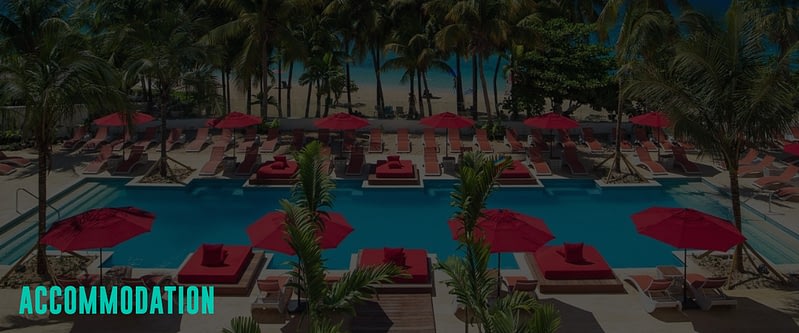
The accommodation cost in Jamaica varies depending on the travel season and location. But generally, a bed in a hostel dorm starts at $18 in Port Antonio, $20 in Kingston, and $25 in the more touristy areas of Montego Bay. Free wifi is standard, and most offer complimentary breakfast. Travelers can also get a private room in hostels and budget hotels for $30 per night. In addition, travelers will find apartments and holiday homes between $100 and $180.
Depending on the location, visitors can enjoy the comfort of a three-star hotel for $80 or an all-inclusive resort for around $140 per night. They can also splash out on five-star hotels and all-inclusive beach resorts from $375.
Food
Jamaican cuisine is a mix of Caribbean, African, and European flavors. Seafood and tropical fruits are joint, and popular dishes include goat curry, patties (a savory turnover), saltfish (dried and salted cod), and dumplings.
A regular meal at an inexpensive restaurant costs around $5, while a fast food combo meal costs $6.50. Travelers who want to splash out on meals can have a three-course meal at a mid-range restaurant for $23.
On the other hand, visitors who want to cook can expect to spend $50 per week on groceries. It includes basic staples like pasta, rice, seasonal produce, and meat or seafood.
Attractions and Transportation
Jamaica’s most sought-after white powdery sand beaches are generally open to the public, while a ticket to the Bob Marley Museum is $25. Visitors can also explore the world-famous Dunn’s River Falls & Park at $25 and Irie Blue Hole for $20.
For budget travelers, public transportation in Jamaica is relatively affordable. A bus ticket starts at $0.65, while the taxis are inexpensive compared to European standards. The initial fare is $1.50, with $4.70 per kilometer increments. As most taxis do not have meters, always check it with the driver and negotiate the price before you take off. Lastly, travelers who want more flexibility and comfort to explore many destinations can rent a car for $50 daily for a multi-day rental.
Average Two-Week Cost
Budget travelers in Jamaica can live with a $50 daily budget or $700 for two weeks. The budget covers the costs of sleeping in hostel dorm beds; grocery shopping and cooking your food; taking public transport; and mainly doing free activities at the beach.
On the other hand, mid-range travelers spend at least $130 daily or $1820 for two weeks. It includes staying in a three-star hotel, taking occasional taxis, dining in local restaurants, doing a few paid activities, and visiting several destinations.
Lastly, travelers can enjoy luxury and privacy in Jamaica for $375 daily or $5250 for two weeks. It includes staying in five-star hotels or all-inclusive resorts, splashing out on meals, taking domestic flights, and renting a car for transport. They can also avail of all the paid tours and activities they want. So for them, the sky is the limit for travel.
Customs And Import Restrictions
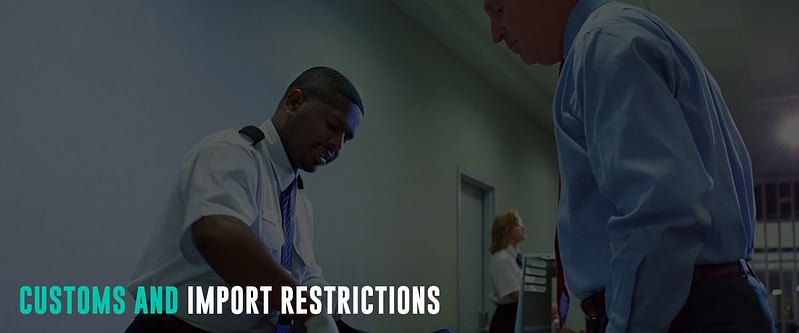
Jamaica Customs Agency allows travelers 18 years and above to enter the country with a $500 duty-free allowance and personal belongings. In addition, they can also bring free imports as follows:
- 200 sticks of cigarettes or 50 cigars, or 230g of Tobacco
- 1 liter of Spirits; 1 liter of Wine
- 170 ml of Perfumed Spirits and 340 ml of Toilet Water.
Jamaica Customs Agency is also responsible for restricting the entry of certain goods and will require permits from relevant authorities. These include fruits, plants, cut flowers, vegetables, soil, meat, live animals and organisms, honey, wildlife, plant material, food, animal products, and live birds.
Moreover, Jamaica Customs Agency prohibits importing and exporting certain goods. These include weapons, ammunition, and illegal drugs such as cocaine, marijuana, heroin, and methamphetamine.
Lastly, travelers carrying currency or monetary instruments over U$$10,000 or equivalent must declare it to customs upon arrival.
Visit the Jamaica Customs Agency portal for complete details on travelers’ import and export restrictions.
Climate Considerations
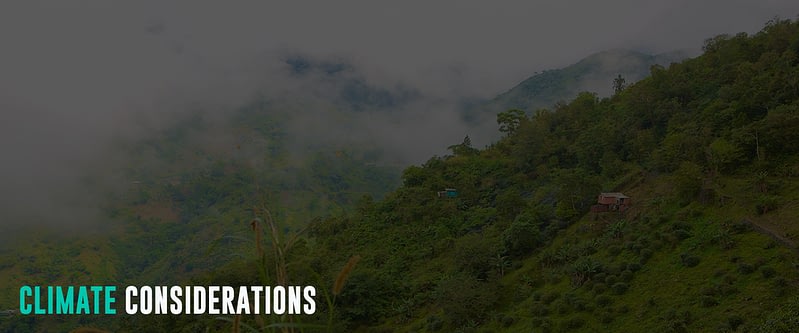
Jamaica has a tropical climate, with hot and humid weather, although higher inland regions are more temperate. The country experiences a relatively fantastic season from December to March and a hot, muggy, and rainy season from May to June and September to November. However, some regions on the south coast, such as the Kingston and the Pedro Plains, are relatively dry rain-shadow areas.
From June to October, the average temperature remains relatively constant at about 31 °C, falling to as low as 20 °C in January and February. Also, the sea in Jamaica is warm enough for swimming all year round, at an average of 27 °C in February and March to 29 °C between August and November.
Jamaica lies in the hurricane belt of the Atlantic Ocean, like the rest of the Caribbean. Because of this, the island sometimes suffers significant hurricane and storm damage from June to November, especially between August and October. Hence, watch the news when traveling to Jamaica during these months.
Primary Transportation Options
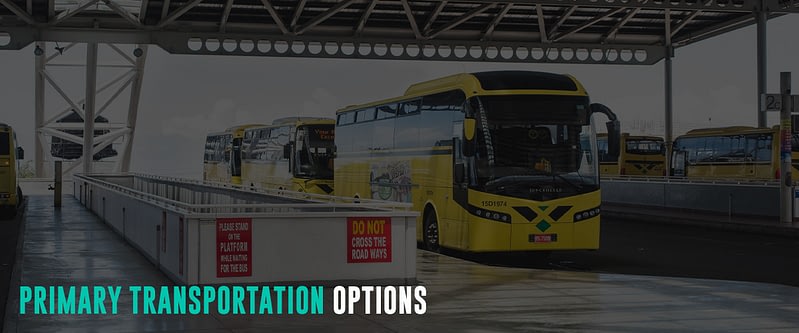
Jamaica has a modern transport system comprising airports, sea and cruise ports, and roadways. All of this offers a safe and efficient network connecting all regions nationwide. Hence, getting around is fast and convenient.
Air
Travelers to Jamaica can enter through one of the three international airports. These are the Norman Manley International Airport in Kingston, the gateway to the capital city, Port Antonio, and the Blue Mountains; Sangster International Airport in Montego Bay as the port of entry to Montego Bay, Ocho Rios, or Negril; and Ian Fleming International Airport for guests going to Ocho Rios resort area.
Sea
Jamaica is a favorite destination for the world’s leading cruise lines, such as Carnival, Royal Caribbean, Holland America, and Marella Cruises. The country’s main cruise ports, Montego Bay, Ocho Rios Falmouth, and Port Royal, are equipped to handle international cruise ships and offer complete services and facilities. Meanwhile, Port Antonio is an idyllic call for boutique cruise ships and mega yachts.
Public Transportation
Getting around by public transport in Jamaica is characterized by buses, minibusses, and route taxis.
Bus
Public transport in the capital city of Kingston has luxury coaches that regularly run on popular routes. The Knutsford Express offers regularly scheduled service to all the island’s resort areas, including Port Antonio, Kingston, Mandeville, Negril, Montego Bay (including the Sangster International Airport), and Ocho Rios. Standard is comfortable, air-conditioned coaches with luggage compartments with added amenities such as complimentary bottled water, free wifi, and restrooms.
Meanwhile, public transports outside the capital are not as regular or fancy. Though buses are the island’s cheapest form of transportation, bus schedules and arrival times can be unreliable. The Jamaica Urban Transit Company Unlimited, a government-run public transport company, operates a fleet of 450 yellow buses, with fares starting at $0.65.
Taxi
Taxis are the most convenient way of getting around in Jamaica. However, travelers must only take official taxis operated by the Jamaica Union of Travelers Association (JUTA) or Jamaica Co-operative Automobile & Limousine Tours (JCAL), as indicated by the acronym on their vehicles. The “route taxis,” with a designated course, pick-up, and drop-off zones, are the most affordable cabs. Look for red and white license plates.
Taxi fares vary according to location and distance. Generally, fares are pretty reasonable in Kingston and the less touristy areas. For example, a taxi from New Kingston to Devon House or the Bob Marley Museum will cost about $5, around $20 from the airport to New Kingston, and $12 from New Kingston to Stony Hill. Meanwhile, taxi fares on the north coast are more hefty at around $50 for ten miles.
Not all taxis have running meters, so agree on a price before getting the ride. Do not be afraid of negotiating.
Car
Travelers to Jamaica can choose from familiar car rentals company like Hertz and Budget or local companies like Island Car Rentals. It gives visitors more flexibility and privacy when exploring the island. However, be careful driving on lumpy roads and reckless drivers. Rental rates start at $50 daily, and note that Jamaica drives on the left side of the road.
Start Trip Planning
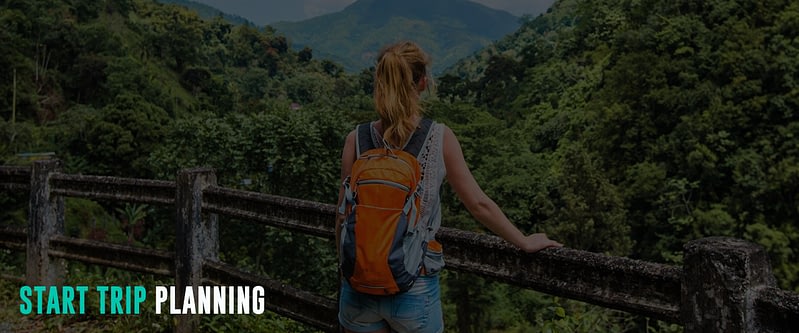
Travel-Wise is made from the ground up to help people travel more, break down the barriers that make it tough to get going, and start your journey as painlessly as possible. Bookmark our other Country Guides to help kick-start your research for future travels. We also offer templated itineraries from our staff and community that help serve as a building block for your trip plans. Alternatively, we also utilize AI to offer a way to generate itinerary ideas. This saves much time just getting you up and running with a template. From there, you can use the trip planner to create your customized itinerary, invite friends and family for collaboration, find others from Travel-Wise to join the trip, book and track important information, journal, and share your experiences at the end or along the way!

